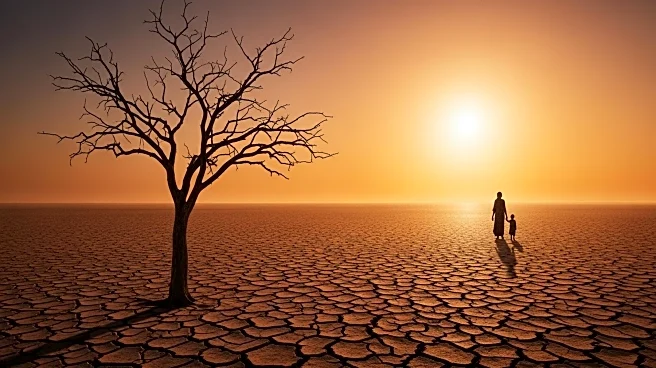What's Happening?
The Sahel region in West Africa is experiencing severe impacts from climate change, with women and children being disproportionately affected. Despite contributing only 2% to global greenhouse gas emissions, the region faces worsening climate conditions, including severe droughts, deadly floods, and rapid degradation of natural resources. In 2024, unprecedented rains led to massive flooding in Mali, destroying over 43,400 homes and displacing more than 200,000 people, primarily women and children. These displaced communities often lack access to public services and face increased risks of rights violations, particularly concerning their right to life as protected by international human rights covenants.
Why It's Important?
The situation in West Africa highlights the broader implications of climate change on vulnerable populations, particularly in regions with minimal contributions to global emissions. The displacement and lack of resources exacerbate existing inequalities, with women and children facing heightened risks of malnutrition and disease. The region's challenges underscore the urgent need for international support and policy interventions to address climate-induced displacement and ensure the protection of human rights. The ongoing climate crisis in West Africa serves as a critical example of the disproportionate impact on marginalized communities, emphasizing the need for global climate justice and equitable resource distribution.
What's Next?
As climate conditions continue to worsen, the affected communities in West Africa may face further displacement and resource scarcity. International organizations and governments may need to increase humanitarian aid and develop long-term strategies to mitigate the impacts of climate change. This could involve enhancing infrastructure resilience, improving access to essential services, and implementing sustainable development practices. Additionally, there may be increased advocacy for stronger international climate agreements to address the root causes of climate change and support vulnerable regions.
Beyond the Headlines
The ongoing climate crisis in West Africa raises ethical and legal questions about the responsibility of wealthier nations in contributing to and addressing global climate change. The situation also highlights the need for culturally sensitive approaches to aid and development, ensuring that interventions respect local traditions and empower communities. Long-term shifts may include increased migration patterns and changes in agricultural practices, necessitating adaptive strategies to sustain livelihoods and protect vulnerable populations.










